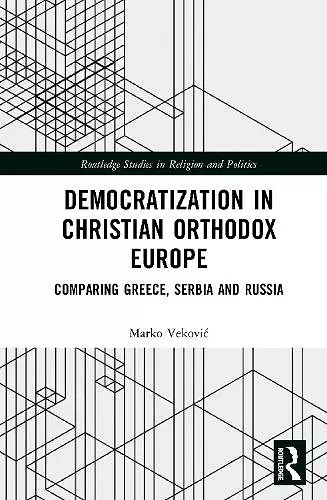Democratization in Christian Orthodox Europe
Comparing Greece, Serbia and Russia
Format:Hardback
Publisher:Taylor & Francis Ltd
Published:25th Sep '20
Currently unavailable, and unfortunately no date known when it will be back
This hardback is available in another edition too:
- Paperback£41.99(9780367501174)

For a long time, Orthodox Christianity was regarded as a religious tradition that was incompatible with democracy. This book challenges this incompatibility thesis, offering an innovative and fresh theoretical framework for dealing with the issue of Orthodoxy and democracy.
This book focuses on the political behaviour of Orthodox Christian Churches in the democratization processes from a comparative perspective, and shows that different Orthodox Churches acted differently in the democratization processes in Greece, Serbia and Russia. The fundamental question that arises is – why? By focusing on institutions, rather than on political theology, this book answers this question from a comparative perspective. By studying the historical, cultural, and political roles of the Orthodox Christian Church in these three countries, the author examines whether it is logical to presume that the Church played a significant role in the democratization process.
This book will be of great interest to academics and students globally who teach, study, and research in the emerging field of religion and democracy.
"The dominant consensus among political scientists, and in the West more broadly, is that Orthodox Christianity is unfriendly towards democracy. In this critically important study, political scientist Marko Veković surprises readers with a far more dynamic and diverse reality. Through incisive analysis and thorough research, he demonstrates that Orthodox churches have acted both as leaders and resisters in the wave of democratization in Orthodox-majority countries that has taken place since the end of the Cold War. In doing so, he succeeds in filling a yawning gap in scholarship on religion and global politics and in producing a book that every student of this field would do well to read." — Daniel Philpott, University of Notre Dame, USA
"The relations between Orthodox Christianity and democratisation have often been portrayed in a negative light, not the least in post-communist times. By comparing democratisation processes in three predominantly Orthodox countries (Greece, Serbia and Russia), this book offers rich and valuable insights and argues for a necessary nuanced approach to the specificities of each Orthodox milieu that will help avoiding generalisations and ideologisations." — Vasilios N. Makrides, University of Erfurt, Germany
"The book will be useful not only for those who are professionally engaged in the religion issues, but also for people who are interested in the direction and course of political processes in the modern world. Considering religious traditions and political practices in countries of the Orthodox Christian Churches, the author shows that in a situation of postmodernism in the context of cultural ambiguity determination changes occur not only in the basis of identity, but also in relations between the Church, government and society that has affected the process of democratization in Greece, Serbia and Russia." — Nataliya Velikaya, Russian State University for the Humanities, Russia
"This book is a valuable contribution of the Belgrade’s school of politology of religion towards better understanding of the political importance of Orthodox Christianity across Eastern Europe. Dr Marko Veković offers useful, original and comparative insights in the roles of the Orthodox Christian Churches in the political processes in Greece, Serbia and Russia, and shows that studying and analysing religion is of great importance for understanding politics in this part of the world." — Miroljub Jevtić, University of Belgrade, Serbia
ISBN: 9780367420833
Dimensions: unknown
Weight: 381g
162 pages